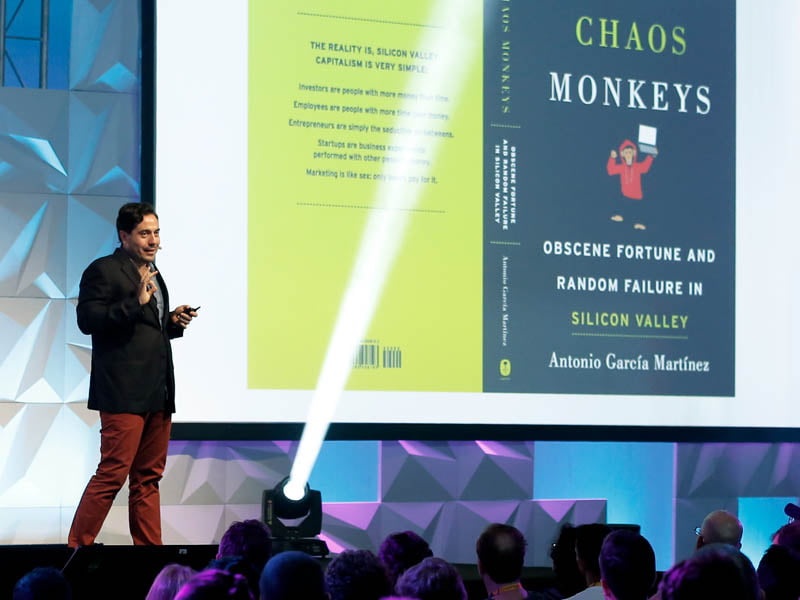The political power building inside the big social media platforms like Twitter and Facebook is probably already too difficult to constrain says the man who led the adtech team that helped Facebook make a motza from mobile.
Antonio Garcia Martinez was a star speaker at the StartCon 2017 event at Sydney’s Randwick Racecourse, a potpourri of startup founders, staffers, investors and tyre kickers that has doubled in size from last year.
In a fast, sharp and entertaining presentation on Saturday afternoon, Mr Martinez waded through everything from the laughably small size of the team that helped crack mobile ad revenue for Facebook to Twitter’s potential demise, even though it is the favoured platform of the tweeter-in-chief.

There’s plenty of grey matter stirring inside Mr Martinez’ bonce – he studied physics at Berkeley, was a quant for Goldman Sachs, a product manager at Facebook and CEO/founder of adtech outfit AdGrok.
He is also the author of Chaos Monkeys: Obscene Fortune and Random Failure in Silicon Valley. In the book he makes the point that arse often beats class when it comes to the big-time tech entrepreneurs.
No more so than at Facebook in 2011, where Mr Martinez was on the mobile adtech team that helped Facebook swallow billions from smartphone users as they switched from using Facebook on desktop to mobile apps.
Nobody at Facebook from Mark Zuckerberg on down saw that coming, says Mr Martinez, and these days mobile ad revenue makes up almost 90 per cent of Facebook’s total ad revenue.
He’s also pretty harsh on Twitter’s future. “They can’t ship shit,” he says and laughs at Twitter ‘innovations’ like doubling the character count on tweets to 280 characters.
At Facebook that would be accomplished without much thought in an afternoon, he says.
When it comes to the media power vested in social media platforms where news consumers sit inside algorithmically powered feedback loops of their own prejudices, Mr Martinez says there’s probably no answer there.
“There’s two components to that power,” he says. “One is the ad side with Russian trolls, and I think that should be shutdown and Facebook has the tools to shut that down and they will.
“The whole Russian side of it going to be crushed in the next few months,” says Mr Garcia.
“The side that is more problematic is the organic side. The fake news, the filter model. The switch that everyone is pushing for is having Facebook become the editor-in-chief to the world.
“The thought of Zuck (Facebook CEO Mark Zuckerberg) sitting in an editorial meeting like you have at your organisation fills me with horror,” he says.
“The guy’s a genius, I worked for him I don’t think he’s an evil person, but I don’t think I want Facebook filtering what I see in a feed.”
Does he see government stepping in to try and regulate Facebook’s media power? Mr Martinez doubts there is a legal remedy.
The anti-trust laws that helped control the market power of the nineteenth century US business barons up to the first wave of big tech outfits like IBM just doesn’t have the right set of teeth to take on a Facebook or Google.
“The way US antitrust law works, it was written in an era of industrial factories. Any regulation that some dude in US Congress comes up with to regulate Facebook ads is either going to be horrible and kills the ecosystem or it’s going to be irrelevant.”
As for the next big thing in business disruption, Mr Martinez likes shipping logistics.
“Shipping is definitely going to be something that’s going to change the world. He was tossing up jumping on board with a shipping logistics startup but decided to write Chaos Monkeys instead.
“It was either the book or be one of the founders, so I did the book.
“When they sell to the Chinese for a billion dollars, I’ll be shitting myself with regret that I didn’t do it, but here we are (with the book) and immortality and whatever else comes.”
Do you know more? Contact James Riley via Email.

